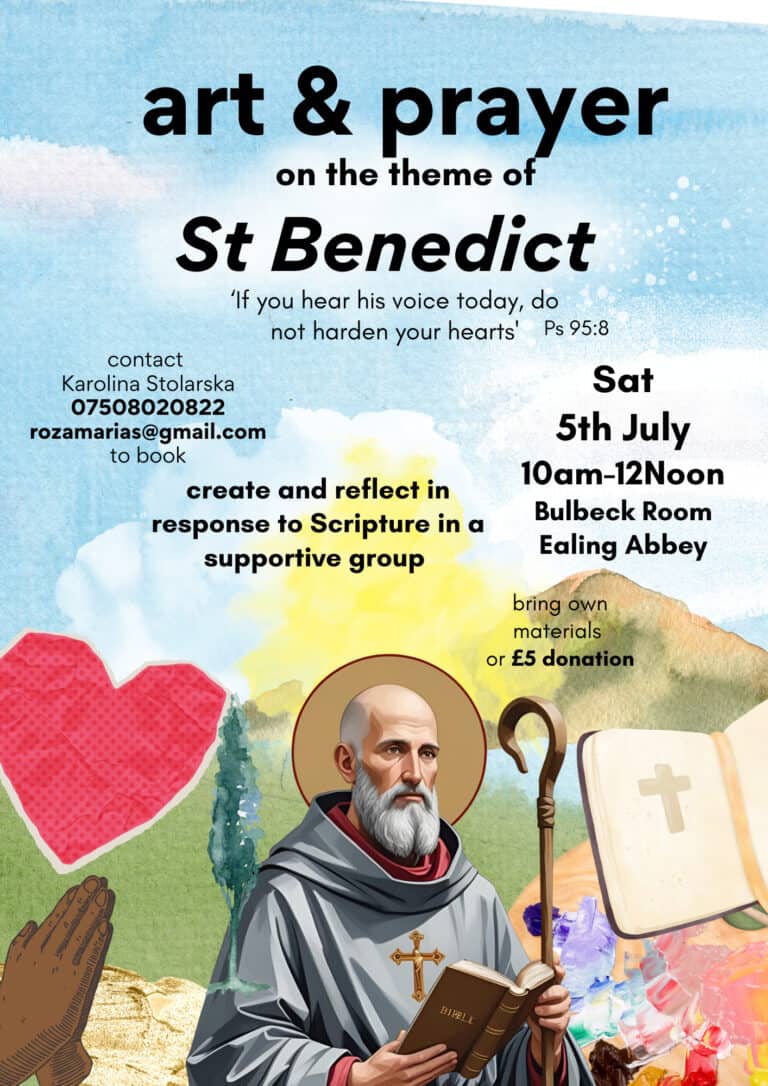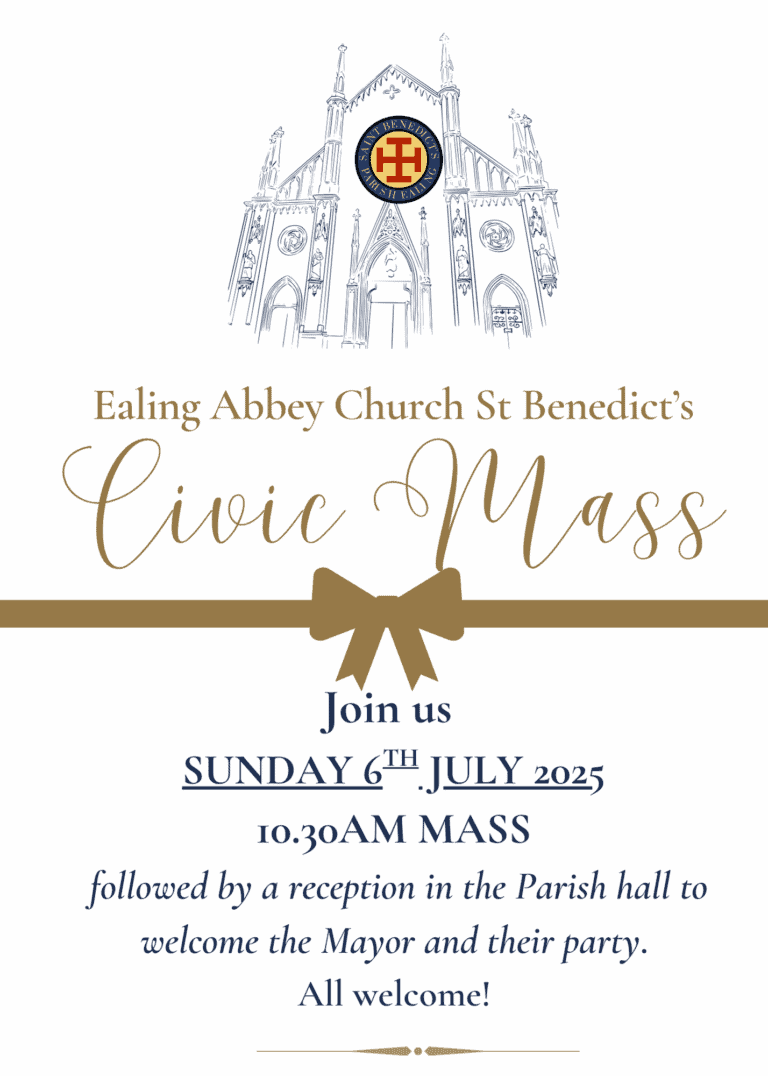Dear Parishioner,
On a visit to Syon Park the other day I picked up in the gift shop a little book about the history of the Catholic community of Isleworth. The author defines the purpose of the Church as being:
to bring people to understand and respond to God’s unconditional love
and reflect that love within the parish and the wider community.
I think that puts it well. When we know God’s love for ourselves then we are able to show that love in our lives to others. Indeed this is what the Church is for, not just to make ourselves feel good. As has been said, the Church is the only organisation that exists for the benefit of those who are not its members.
I would only question the use of the word understand. Can we really understand in any complete sense the nature of God? Is not receiving and responding to God’s love more important than understanding it? Understanding is an intellectual activity involving the mind, while being open to the love of God engages the whole of our person. The Church has placed a lot of emphasis on theology, the intellectual understanding of God and his nature, the explaining of what we believe about him, and to some extent this is necessary, but the greatest theologians have always known its limitations. St. Thomas Aquinas, after a lifetime of study and writing, said that none of it was worth anything beside the sheer joy of knowing the Lord Jesus. And St. Augustine went so far as to say, ‘If you can understand it, it is not God’! Theology is a secondary discipline: experience must come first.
I used to know an Irish sister Kathleen O’Sullivan who wrote a programme of prayer and faith-sharing (she was the person who first introduced that term which others have taken up, though not always in her sense) called A Way of Life, later reworked as Light out of Darkness. She felt that the usual type of discussion group we have in the Church does not take us very far because it is too much concerned with what we think, the exchange of opinions: ‘I think this, I think that.’ ‘You can’t possibly think that, let’s get you sorted out!’ etc. Faith-sharing, as Kathleen saw it, is not talking about the faith as a set of beliefs, but sharing with others our own personal faith, our own experience of God. It is saying, ‘This is how God is for me, this is how he is working in my life, so far as I can see it through my prayer and reflection.’ It is much more difficult to share in this way because it needs a real involvement of oneself, whereas you can discuss things from the mind without really putting anything else of yourself into it: you go away thinking, ‘That was interesting,’ but it goes no further. Faith-sharing in Kathleen O’Sullivan’s sense is very different, and it is what will make a difference both to oneself and others – at the very least others can be encouraged to hear that everybody else is struggling as they are. I took a group of seven or eight people through this programme over about a year and can testify to how much it meant to them: even twenty or so years later, long after they have gone their separate ways, they still remember it fondly and the bond it created between them.
The limitations of our human take on God are clearly seen in relation to the Gospel reading for this Sunday, the parable of the labourers in the vineyard. The owner of the vineyard hires men for a day’s work and agrees on the wage he will pay them. During the day he sees other workers standing idle and takes them on as well. When there is just an hour remaining there are still men idle, whom he hires to work for the rest of the time. So far, so reasonable. Now comes the time for payment. The owner of the vineyard pays each group of workers the same wage he had agreed for those who worked the whole day in the heat of the sun, including those who worked for only one hour: he even pays them first, before the others.
The men who worked all day naturally feel aggrieved, as anyone would, and grumble at the vineyard-owner. Notice his reply: ‘I am not being unjust: did we not agree on the wage? I choose to pay the last-comer as much as I pay you. Have I no right to do what I like with my own? Why be envious because I am generous?’ You might ask yourself if you would find this a satisfactory reply. I think most people would say that the vineyard-owner is not being fair and just in the way he treats the different groups of workers and those who grumble about being short-changed are well justified in doing so.
We may remember, however, that these parables of Jesus, although they use illustrations drawn from the natural world or the human world, are not about those worlds. You could not run a business in the way the vineyard-owner does, you would soon go bankrupt. The parables are about the kingdom of God, which does not follow business codes or human ideas of justice. The kingdom of God means the reign of God’s love, which knows no limitations, conditions or restrictions. It is given, poured out unstintingly whether we deserve it or have earned it or not – simply because it is the nature of God to be like this, for, as Isaiah remind us in this Sunday’s readings:
My thoughts are not your thoughts,
my ways not your ways – it is the Lord who speaks.
Yes, the heavens are as high above earth
as my ways are above your ways,
my thoughts above your thoughts.
We may not like the way God is. We might prefer him to be a God who is more in line with our human ways of thinking and dealing, but that only shows how inadequate our understanding, our ways of thinking are to comprehend the fullness of the mystery of God. We need also to remember that if God chooses to be generous towards those whom we believe do not deserve it, this does not mean that we are missing anything. Where love is divine – unconditional, unlimited – there is plenty of it to go round, an endless amount in fact.
We might compare this parable with that of the prodigal son, whose elder brother has to learn that God’s love cannot be earned by our efforts, it can only be received as a free gift, and if we expect to receive it ourselves we must realise that God will wish to love everyone else in the same way and to the same extent – including those, like the prodigal, whom we judge to be unworthy of it. The elder brother has to learn also that if God behaves like this to his feckless brother, this does mean that he is left out: as the father says to him, ‘All I have is yours.’
The passage from Isaiah begins, Seek the lord while he is still to be found, call to him while he is still near. God is always to be found, there is nowhere we can go where he is not. In order to know him, however, we have to let go of our thoughts, desires and expectations, respect his sovereign freedom to be as he will and allow him to be God in us and for us. Letting go is the key to any growth in spiritual maturity.
Sr. Kathleen O’Sullivan has the idea of a ‘minute oasis.’ As you go through the day, which may seem dry and uneventful, stop at intervals to rest in the presence of God and let him refresh you. You do not need to say or think anything, but just be there with God, letting go of everything else. As the saying puts it,
LET GO – LET GOD.





